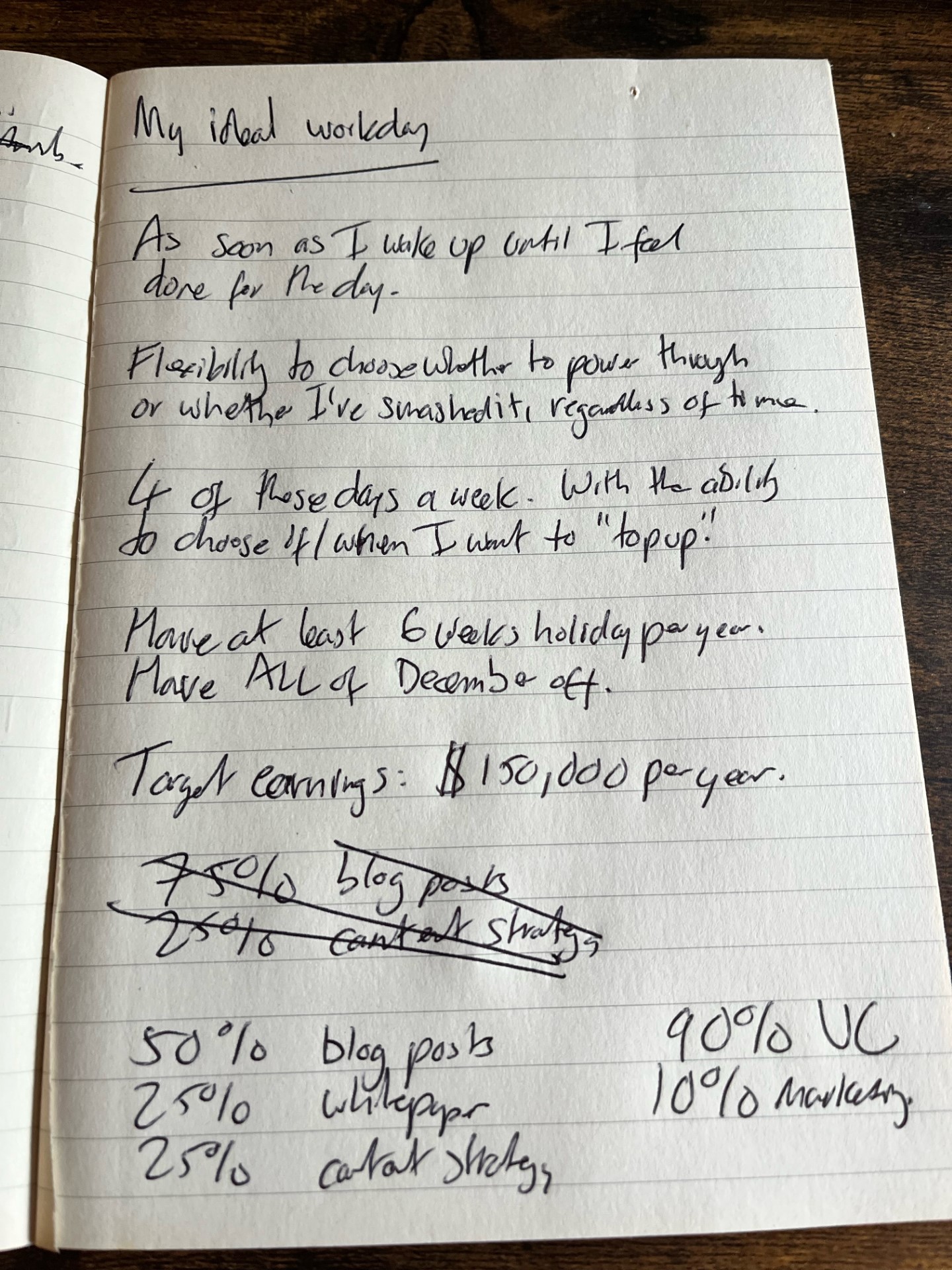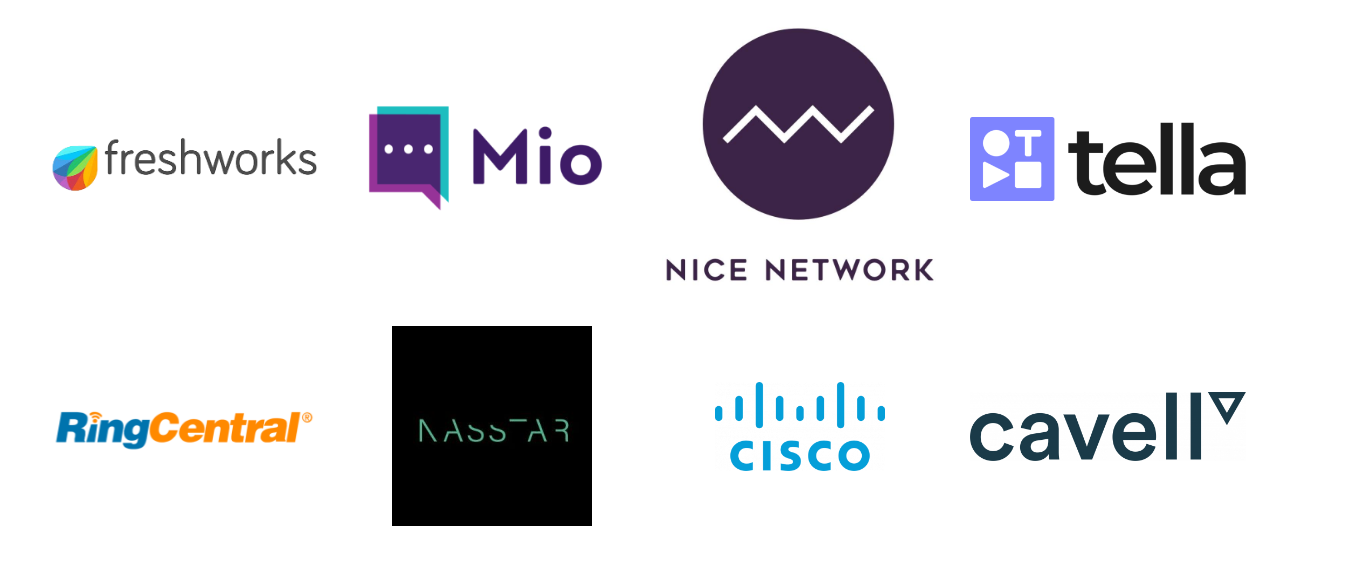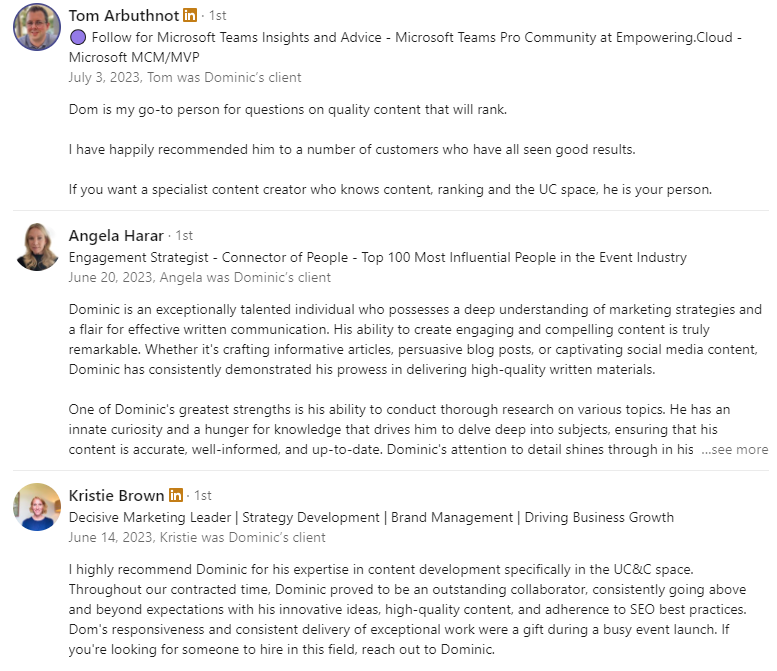If you’re looking to further your career as a successful freelancer, I’ve written this blog post to help you learn from someone who’s averaged $200,000 in profit over the last five years.
If you’re hoping for shortcuts and secret sauce, this isn’t going to be the post for you.
If you’re committed to carving a successful freelance career for years to come, you’re in the right place.
Sounds like a lot of work, but I’ve not worked more than four days a week either.
To my personal definition of what being a successful freelancer means, I’m extremely happy with my current position.
Defining what success meant to me is a crucial part of my business strategy.
That’s why we’re starting there in this list of 10 steps to becoming a successful freelancer….
1 - Define what success means to you
Freelance success means different things to different people.
To some, it means earning loads of money and going on flash holidays.
To others, it means the flexibility to spend time with their children.
For me personally, it’s a mixture of earning great money at the same time as maintaining a work-life balance that’s heavily weighted in favor of life.
So, how do you define success?
Try this exercise out for size. I do this at least once a year to make sure I’m focused on growing my freelance business the right way.
- Write down your ideal workday
- Include the time of day you’d like to work
- Include the number of days you’d like to work
- Include the number of days a week/month/year you’d like to work
- Include the amount of money you’d like to earn each year
- Include what you’d like to be doing

This is what being a successful freelancer is all about.
Once you’ve defined your success criteria, the next nine steps in this blog post are going to help you out tenfold (or ninefold!).
2 - Choose a niche
Honestly, I wouldn’t have gone freelance if I didn’t have a wealth of experience in my niche.
I work exclusively in the telecoms sector.

Why?
Because I have a particular set of skills (no, I’m not Liam Neeson) that are in high demand in that industry.
When people need a content marketer, who has been there and done that, I’m significantly more qualified than a generalist writer.
Put yourself in the shoes of the hiring party (your client):
- Need to hire a freelance writer
- Don’t have time or resource to write themselves
- Wants high-quality content delivered with minimal edits needed
- Wants the process to work first-time so this freelancer becomes autonomous
- Ideally, wants a mutually beneficial partnership where both freelancer and client make lots of money
If you appreciate what a client wants from their next freelance writer, it’s easy to see why being a specialist in a particular niche will make you stand out as a better applicant than any old freelance writer.
There’s also the massive benefit of not having to spend hours researching new industries every time you get a new client. My time-to-completion is significantly lower than a generalist writer. Remember when I said about work-life balance?
I am embedded in the telecoms industry. I know where all the resources I need are. I have influencers and analysts on speed dial (well, in Zoom and Teams but you get it).
I’ve literally worn the t-shirt.
What’s better than knowing a lot about a topic? Becoming a subject matter expert.
3 - Become a subject matter expert
The next step in choosing a niche is becoming extremely competent in that industry.
A subject matter expert (SME) is someone who knows a lot about a particular topic.
Common SME job types include:
- Analysts
- Consultants
- Product Managers
- Pre-Sales Consultants
- Product Marketing Managers
- CTOs
These are all examples of people with high knowledge and experience in their subject.
But they might not necessarily be good at your skill. It might be freelance writing, other types of marketing, or something entirely unrelated.
Whatever your skill is, there’s an industry that needs it. Being an expert in that subject puts you at the top of a highly-desirable list.
That said, you also need to match your expertise with being good at your freelance craft.
4 - Get good at your freelance craft
This goes without saying but is often the biggest stumbling block for freelancers to be truly successful.
It’s one thing to complete writing assignments on Upwork for little money, but there’s no correlation between doing average work and freelance growth.
Likewise, some clients will happily pay for content that is worthy of a first draft. If they have the in-house resources to take your version and turn it into something high-quality, it makes sense for them to buy your service if what they need the most help with is moving the needle from blank canvas to workable draft.
Furthering your career from this stage to becoming a successful freelancer, however, takes time and effort.
To get better at your freelance craft, try the following:
- Take a course on your skill
- Read a book about your skill
- Request peer-level feedback
- Request senior-level feedback
- Follow similar people on social media
When you surround yourself with positive influences and resources that will better your career, you create a bubble of self-improvement.
In time, if you choose to, you can become the best at your craft in your niche.
If you're a freelance blogger/content writer, check out my blogging course: How To Write Blog Posts That Get 500,000 Views
5 - Become the best at your craft in your niche
If you match being a subject matter expert and being the best at your specific skill, you create demand.
You become the benchmark for how much to charge for the highest-quality deliverables.
You become the go-to person for the particular thing that you do for that industry.

People (in my industry) know what I do, how well I do it, and they approach me for that exact reason.
Becoming the best (or one of the best) at your freelance skill, in your niche, is a surefire way to generate an ephemeral pipeline of customers.
6 - Generate an evergreen pipeline of customers
When you deliver consistently great work, customers will come back time and again.
Even better, customers will tell other people how great you are.
In my book, The Autonomous Freelancer, I mention how 24% of my income in 2022 was through customer referrals.
During the process of writing the book, I got three referrals. Here’s a snippet I included:
“Editing note: I got 3 word of mouth referrals today. Two within my niche and one under the blanket of digital marketing. These came from two former customers and one person I network with online. Word of mouth is real, folks.”
Most freelancers tell me they suffer from imposter syndrome when it comes to asking for referrals.
To that, I say, when you meet or exceed expectations, referrals happen organically.
So, if 24% of my income was through referrals, what made up the remaining 76%?
Let me tell you a little story about promoting your work…
7 - Promote your work
When I got my first inbound lead as a freelance writer, can you guess how the client found me?
Through an article I had written.
They saw the article, liked it so much, and asked me to do something similar for them.
Here’s the message I got:
“Hi Dominic,
I saw that you're available for contracting, and after previously reading several of your articles in UC Today, I thought you might be interested in helping write and/or edit & lead a content publication that our startup, https://m.io is launching. If you are the least bit interested I’d love to set up a time to speak further.”
When momentum builded and I started writing for a few more customers, I naturally shared the articles. I was proud of them, so why wouldn’t I?
What I didn’t realize was that what I was also doing was a solid job of content distribution.
Effectively, the more people who saw my content, the results of my content, or even the behind-the-scenes work that went into it, the more chance I had of one of these people approaching me for work.
This has been the entire basis of my freelance career.
In my five years of being a full-time freelancer, I’ve not once sent a cold email or DM pitching for work. And I’ve not once had a day where I didn’t have any billable work.
It’s through this 76% of my clients (promoting my work) and the 24% of clients (referrals) that lead me to continuously work on high-value assets.
8 - Work on high-value assets
The higher the value for the customer, the more you can charge for it.
It’s a simple rule of thumb that most freelancers don’t understand.
When you’re writing blog posts that **anyone** can write, there’s a race to the bottom on price.
If Jules, who is a generalist writer, is as good as you, but $50 cheaper, it makes sense for your potential client to choose Jules instead.
However, if you’re writing technical blog posts about SAP integrations, and you happen to have a wealth of SAP knowledge and are a great writer, you have taken ticket number one in the queue.
The more niche you get, the higher the chance of finding a high-value asset to work on. As this chance increases, so does your chance of being hired to deliver it.
Over time, you can develop this wonderful cycle that looks like this:
This cycle can be continuous. But, over time, both your skills and your niche require adjusting and learning.
Staying still is often the cause for many freelancers to get left behind.
One day, you’re writing $5,000 whitepapers. The next, you’re wondering why you haven’t had any work for a month.
Instead of standing still, start embracing continuous learning.
9 - Embrace continuous learning
When I wrote my first $10,000 whitepaper, I invested some of that money into resources that I knew would make me better at my job.
In fact, I can tell you what I bought:
- A Kindle book on the more technical aspects of SharePoint
- An online course on how to write Twitter threads
- An online course on editing blog posts
- A book on business management
Each of these played a small but effective part on the rest of my career. I learned something. I got better at something.
It’s this mindset that there is always something to learn that keeps me at the top of my freelance game.
If anyone says, “Have you seen that new feature?”, I can say yes. If someone asks me to write something outside of my wheelhouse as part of a project, I don’t lose the project because I have to say no.
All the skills you learn and develop over time add significant value to your price tag. These skills, what you know, plus an understanding of pricing theory, can lead to you becoming a very successful freelancer indeed.
10 - Understand pricing theory
With a lot of my clients, I charge way more than the people competing with me. I can do this because I understand the value of the assets I’m creating. I understand pricing theory.
In general, there are five pricing methods for freelancers:
— Dominic Kent (@DomKent) June 14, 2022
- Hourly
- Day rate
- Retainers
- Fixed (productized)
- Value-based
The latter is thinking like a consultancy. And is how the highest-paid freelancers make money.
With a combination of my subject matter expertise and my great craft, I know that I’m the best-positioned person to deliver that asset.
So what is pricing theory?
“The price of a particular good or service is determined by the relationship between producer supply and consumer demand at any given point.”
- Caroline Banton, What Is Theory of Price?
For example, I create whitepapers for enterprise technology companies. If that asset converts just one customer, it is worth $100,000 per year.
If I know this, my customer knows this. So they are willing to pay for the best version, created by a specialist.
They are willing to pay $10,000 for this. They might even be willing to pay more.
If you treat every project or asset as an investment, or understand that’s what your customer is doing, you can stop charging per hour, per word, or per day.
Instead, charge the value of the asset.
Note : not all customers work like this. Finding a customer who understands the value of your craft is key here. This is where identifying niches and getting really good at your craft come into play. When you become in-demand, you set the playing field.
Where to start?
Phew! Sounds like a lot of work.
I’m not going to lie. It is.
To get to the point where I deemed myself a successful freelancer, it took years of experience-gaining, years of refining my craft, and years of working out how much I could charge.
Start with #1 in this blog post: define what success means to you.
Without this element, everything else in your freelance business plan is flawed.
When you know what success means, you can take steps towards achieving it.
From there, everything else is upward trajectory 🚀
Ready to take the next step in your freelance career?
















